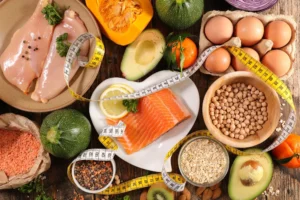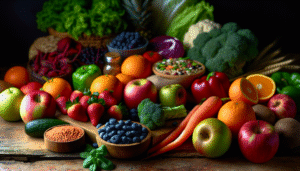When it comes to maintaining a healthy weight, there’s often too much focus on what to cut out—sugar, carbs, fat—rather than what to include. But eating well isn’t about deprivation; it’s about nourishment. The key to natural weight management is choosing foods that support your body’s metabolism, promote satiety, and nourish your system without unnecessary calories. Whole, nutrient-rich foods fuel your daily energy and make it easier to manage weight in the long term without strict dieting.
Leafy Greens: Low in Calories, High in Volume
Leafy greens like spinach, kale, arugula, Swiss chard, and romaine are essential for weight management. These vegetables are low in calories but high in fiber and volume, which means you can eat large portions without overloading on calories. They are rich in vitamins A, C, and K, as well as antioxidants that help reduce inflammation and support overall health.
Because leafy greens take time to chew and digest, they also help you feel full longer. Whether you toss them into smoothies, build salads, or add them to soups and stir-fries, they are a simple, natural tool for weight control.
Oats: The Ultimate Whole Grain for Satiety
Whole oats are a powerhouse when it comes to feeling full and satisfied. Their high soluble fiber content—particularly beta-glucan—helps slow digestion and promotes a steady release of energy. This benefit not only curbs cravings but also prevents the blood sugar spikes and crashes that often lead to overeating.
Having a bowl of unsweetened oatmeal in the morning, accompanied by fruit, nuts, or seeds, can kickstart your day positively. It keeps you fuller for longer and reduces the temptation to snack unnecessarily throughout the day.
Eggs: Protein-Rich and Nutrient-Dense
Eggs are among the most nutrient-dense foods available. They’re high in protein, healthy fats, and essential nutrients like vitamin B12 and choline. Studies have shown that eating eggs for breakfast can increase satiety and reduce calorie intake for the rest of the day.
Contrary to outdated beliefs, eggs don’t significantly impact blood cholesterol for most people. Instead, they provide a complete source of protein that helps maintain muscle mass during weight loss and supports a healthy metabolism.
Beans and Legumes: Plant-Based Protein and Fiber
Beans, lentils, chickpeas, and other legumes are excellent foods for weight management. They’re rich in both fiber and plant-based protein, two key nutrients that help keep you feeling full and satisfied. They also support stable blood sugar levels, reducing hunger and curbing cravings.
Legumes are incredibly versatile and affordable. You can add them to soups, stews, salads, and grain bowls for a satisfying and nutritious meal that naturally supports weight goals without processed ingredients.
Berries: Sweetness Without the Sugar Spike
When you’re trying to manage your weight, sweet cravings can be challenging. Berries like blueberries, raspberries, strawberries, and blackberries offer a naturally sweet solution. They are low in calories and sugar but high in fiber, antioxidants, and vitamins.
Berries satisfy your sweet tooth without causing blood sugar spikes, making them a smart choice for snacks or as toppings for yogurt, oatmeal, or smoothies. Their high water content also helps with hydration and fullness.
Greek Yogurt: Protein and Probiotics in One
Plain Greek yogurt is a high-protein food that promotes satiety and muscle preservation while supporting gut health. It contains probiotics that help balance the digestive system, which can be important for weight regulation and immune function.
The key is to choose plain, unsweetened varieties and add your own toppings like berries, cinnamon, or flaxseeds. The combination of protein, healthy fat, and beneficial bacteria makes Greek yogurt a powerful ally in natural weight management.
Avocados: Healthy Fats That Satisfy
Despite their fat content, avocados have gained widespread recognition as a healthy and satisfying food. They’re rich in monounsaturated fats, fiber, potassium, and antioxidants. These fats support heart health and keep you feeling full without the sluggishness associated with heavy meals.
Avocados help regulate hunger hormones and may even reduce belly fat when consumed in moderation. Spread them on toast, add them to salads, or blend them into smoothies for a creamy, nutrient-rich boost.
Nuts and Seeds: Small but Mighty
Nuts and seeds like almonds, walnuts, chia seeds, flaxseeds, and pumpkin seeds are calorie-dense, but they’re also full of nutrients that support weight control. Their combination of healthy fats, fiber, and protein helps regulate appetite and promote satiety.
A small handful of nuts as a snack can prevent overeating later in the day. Chia and flaxseeds, when soaked, form a gel-like consistency that can help regulate digestion and promote fullness. They’re ideal additions to yogurt, smoothies, or baked goods.
Salmon and Fatty Fish: High-Protein and Anti-Inflammatory
Fatty fish like salmon, sardines, mackerel, and trout are rich in omega-3 fatty acids, which are known for their anti-inflammatory properties. Chronic inflammation is often linked to weight gain and difficulty losing weight.
These fish are also high in protein, which boosts metabolism and preserves muscle during weight loss. Eating fatty fish two to three times a week supports heart health, brain function, and a leaner body composition.
Cruciferous Vegetables: Filling and Detoxifying
Broccoli, cauliflower, cabbage, and Brussels sprouts are part of the cruciferous vegetable family. They’re packed with fiber, low in calories, and contain compounds that support liver detoxification—an important function for weight regulation.
These vegetables help you feel full without weighing you down. Roasted, steamed, or sautéed, they’re a great side dish that adds bulk to meals and encourages healthy digestion.
Green Tea: A Metabolism-Supporting Beverage
Green tea isn’t a food, but it’s worth mentioning for its well-researched role in weight management. It contains antioxidants called catechins and a small amount of caffeine, both of which may support fat burning and metabolism.
Drinking green tea between meals can help control appetite, reduce cravings, and give a gentle energy lift without the jittery side effects of coffee. For best results, opt for unsweetened green tea and enjoy it warm or iced.
Conclusion: Eating for Balance, Not Restriction
Healthy weight management doesn’t require complicated diets or harsh restrictions. It begins with choosing real, whole foods that nourish your body, support your metabolism, and keep you satisfied throughout the day. Foods like leafy greens, oats, berries, eggs, beans, and healthy fats not only help manage weight but also enhance energy, mood, and overall wellbeing.
By filling your plate with these naturally supportive foods and listening to your body’s hunger cues, you create a foundation for long-term health and sustainable weight control—without the stress of calorie counting or fad dieting. The path to a balanced weight is built one smart, nourishing meal at a time.




